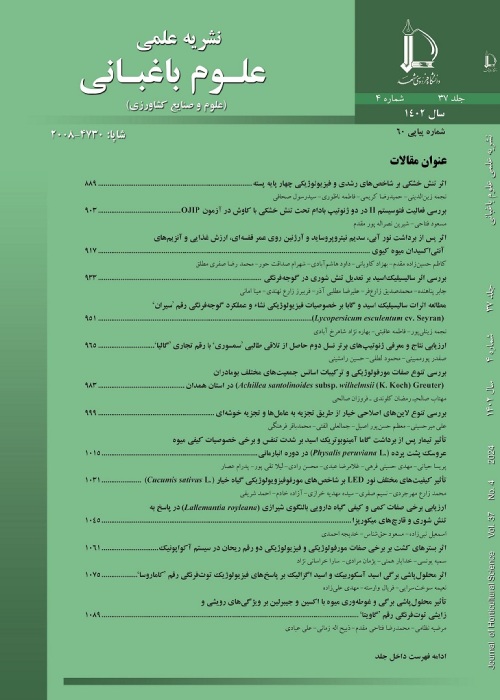A Comparison of Conventional, Integrated and Organic Management Systems on the Quality of Pomegranate Fruit cv. Rabbab-e- Shiraz
Author(s):
Abstract:
Introduction
Pomegranate (Punica granatum L.), belonging to Punicaceae family, is a tropical and subtropical attractive deciduous or evergreen shrub and is one of the native fruits of Iran. With total production of 941804 tons in 2013, Iran is one of the most important pomegranate producers in the world. Pomegranate is an important source of bioactive compounds. Despite the high nutritional values of pomegranate fruits, the overuse of synthetic fertilizers and pesticides in conventional systems reduces nutritional and functional quality of pomegranate fruits. On the other hand, world demand for organic products is growing rapidly in developed countries, especially in Europe, USA, Japan and Australia. Previous studies showed that organic fruits contain higher minerals, vitamins and oxidant activity than conventional crops. Therefore, the aim of the present paper was to compare organic, integrated and conventional management systems in pomegranate orchard on mineral contents and qualitative attributes of pomegranate fruit.Materials And Methods
Pomegranate (cv. Rabbab-e-Shiraz) grown under organic, conventional and integrated management systems in a commercial orchard, in Nourabad Mamsani, Fars province, was used for this study. Pomegranate fruits were harvested at commercial harvest stage and transported in an air-conditioned vehicle to the laboratory of Horticultural Science Department, University of Guilan, Rasht. Some factors like fruit, aril and peel weight, aril length, weight ratio of peel to aril, peel to fruit and aril to fruit, and seed firmness (Penetrometer, with the diameter of 11 mm) were assessed. In addition, qualitative properties (Total Soluble Solids (TSS), TA (Titratable Acidity), TSS/TA and pH), antioxidant compounds (total phenol, flavonoids and anthocyanin content) in pomegranate juice and mineral nutrients (N, P, K, Ca and Mg) in peel and arils were measured. The experiment was conducted in a randomized complete block design with 4 replications.Results And Discussion
The results showed that fruit, arils and peel weight and fresh weight of peel were significantly higher in conventional system than organic management system. Fruit weight depends on plant nutrition, which, in turn, significantly influences postharvest quality. It is possibly due to smaller cells and less intercellular spaces in organic fruits. In this study, fruit size in organic management system was significantly lower than conventional system; our results in this regard are in accordance with the previous studies reported on kiwifruit, apple and grape . Fruit taste is determined mainly by juice TSS and the ratios between TSS and TA. In this study, juice TSS in conventional and integrated management systems was higher than organic fruits at harvest time. Our findings are in agreement with Beng et al. (6), who reported higher amount of TSS in kiwifruit obtained from conventional system than organic system due to more mature fruit and greater use of nitrogen fertilizers.No difference was found for pH, TA, TSS/TA, seed firmness, total anthocyanin and flavonoid content among the three management systems. The antioxidant activity properties of pomegranate juice were attributed to polyphenols, sugar-containing polyphenolic tannins and anthocyanins. In this study, total phenolic content and antioxidant activity in fruits obtained from organic management system were greater than conventional management system. These results are in agreement with the findings reported in blueberry, peach and grape, apple, kiwifruit and strawberry fruits. Mineral nutrient analysis showed that the concentrations of P, Ca and Mg in peel, and N, P, K, Ca and Mg in aril of organic fruits were lower than fruits of conventional system, but the ratio of Ca to other elements in the arils of organic fruits was significantly higher than conventional system fruits. In apple, N concentration of conventionally grown fruits was higher, while K, Ca, Na and Mg concentrations of organic fruits were higher than conventional fruits. There were positive correlations between total phenolic content and antioxidant activity in pomegranate juice, which was in agreement with the results reported in kiwifruit and grape fruits.
Conclusion
The results of the current study indicated that fruit quality of pomegranate cv. Rabbab-e-Shiraz was affected by the type of orchard management system. Although fruits obtained from organic system had smaller size in comparison with the fruits of other systems, the amount of total phenolic content and antioxidant activity was higher in organic system compared with conventional system, representing a higher nutritional value of organically grown fruits than conventionally grown fruits. Furthermore, organic fruits had higher Ca to N, Mg and K ratio, which can affect the shelf life and postharvest quality of pomegranate fruits.Keywords:
Language:
Persian
Published:
Journal of horticulture science, Volume:30 Issue: 3, 2016
Pages:
447 to 456
magiran.com/p1640955
دانلود و مطالعه متن این مقاله با یکی از روشهای زیر امکان پذیر است:
اشتراک شخصی
با عضویت و پرداخت آنلاین حق اشتراک یکساله به مبلغ 1,390,000ريال میتوانید 70 عنوان مطلب دانلود کنید!
اشتراک سازمانی
به کتابخانه دانشگاه یا محل کار خود پیشنهاد کنید تا اشتراک سازمانی این پایگاه را برای دسترسی نامحدود همه کاربران به متن مطالب تهیه نمایند!
توجه!
- حق عضویت دریافتی صرف حمایت از نشریات عضو و نگهداری، تکمیل و توسعه مگیران میشود.
- پرداخت حق اشتراک و دانلود مقالات اجازه بازنشر آن در سایر رسانههای چاپی و دیجیتال را به کاربر نمیدهد.
دسترسی سراسری کاربران دانشگاه پیام نور!
اعضای هیئت علمی و دانشجویان دانشگاه پیام نور در سراسر کشور، در صورت ثبت نام با ایمیل دانشگاهی، تا پایان فروردین ماه 1403 به مقالات سایت دسترسی خواهند داشت!
In order to view content subscription is required
Personal subscription
Subscribe magiran.com for 70 € euros via PayPal and download 70 articles during a year.
Organization subscription
Please contact us to subscribe your university or library for unlimited access!


